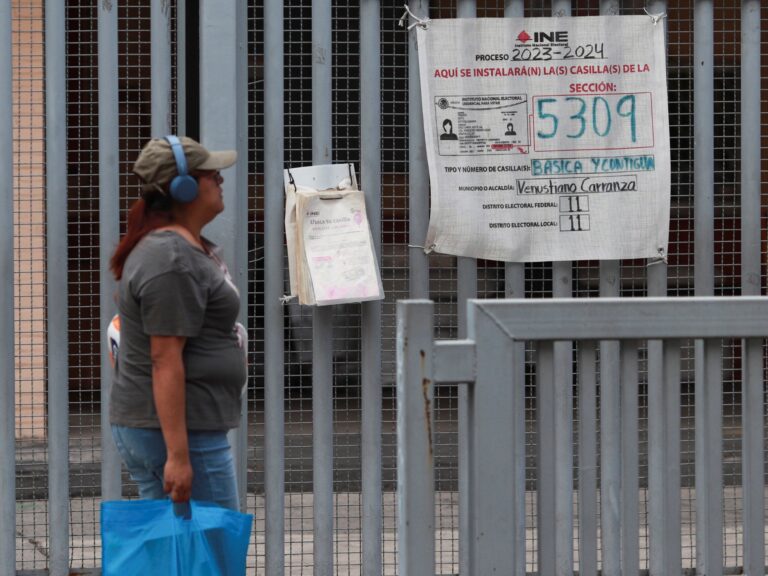The vote has been hailed as a major step for Mexico, with the winner becoming the first female leader in a country often criticized for its macho culture.
Mexicans are voting in national elections, with ruling party candidate Claudia Scheinbaum holding a large lead in opinion polls and expected to become the country’s first female president.
Opinion polls consistently show Sheinbaum leading by about 20 percentage points over his nearest rival, Xochitl Galvez, who represents the opposition coalition made up of the Institutional Revolutionary Party (PRI), the right-wing PAN and the left-wing PRD party, which ruled Mexico for 70 years until the 2000 democratic elections.
Long queues were already forming outside polling stations when they opened at 8am local time (1pm GMT). Polls close at 6pm (11pm GMT on Monday) with the first official preliminary results due to be announced shortly afterwards.
Speaking to reporters from the passenger seat of his car, Sheinbaum said it was a historic day and that he felt at ease on the way to vote.
“Everybody needs to get out and vote,” Scheinbaum, a physicist and former Mexico City mayor, said live on local television.
Dozens of candidates murdered
Sunday’s election will be the largest in Mexico’s history, with voters choosing some 20,000 positions.
But the race has been marred by violence, with 38 candidates killed on the campaign trail – the highest number in Mexico’s modern history – and raising fears that warring drug cartels pose a threat to Mexico’s democracy.
Lisa Sanchez, secretary general of Mexico’s Anti-Crime Coalition, said the electoral process had been the most violent yet.
“87 percent of the candidates who were attacked or killed were actually running for local government-level office. This is very disturbing and speaks to the need to pay attention to and address the level of criminal governance at the local level in Mexico,” she told Al Jazeera.
“The main problem of electoral violence that we are seeing does not come only from criminals. These dynamics of violence involve political actors as well as local-level authorities,” she noted, adding that violence is one of the many tools these actors can use to thwart changes in the political dynamic.
A victory for either Sheinbaum or Galvez would be hailed as a major step for Mexico, as both candidates would become its first female leader in a country often criticized for its macho culture.
The winner will face daunting challenges, particularly in how to rein in organized crime violence that has contributed to more than 185,000 deaths since President Andrés Manuel López Obrador took office in December 2018.
Violence and power and water shortages have been problems as Mexico tries to persuade manufacturers to relocate as part of a nearshoring trend in which companies move their supply chains closer to key markets.
Both candidates have pledged to expand welfare programs, but this could be a challenge amid a huge budget deficit this year and sluggish GDP growth of just 1.5 percent that the central bank forecasts next year.
“Our president really cares about the poor,” Alejandro Benitez, 68, told Reuters, who plans to vote for Sheinbaum even though he lives in Tepatepec, the town in Hidalgo state where his opponent Galvez grew up.
The new president, whose six-year term begins on October 1, will also face a series of tense negotiations with the United States over security cooperation on the massive flow of migrants from Mexico to the United States and drug trafficking.
But Mexican officials expect such negotiations to become more difficult if Donald Trump is elected U.S. president in November’s election.


